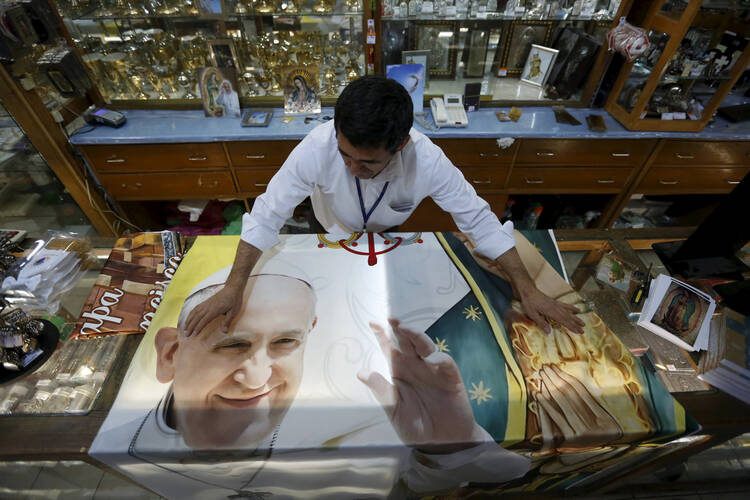When a leading candidate for the U.S. presidency refers to Mexican immigrants as rapists and criminals and rises in the polls; when his competitors joust over who will build a bigger wall and expel more undocumented persons; when the outgoing administration steps up deportation raids to deter future migrants, it is time to reframe the conversation in the United States about our southern neighbor.
Pope Francis’ upcoming visit to Mexico (Feb. 12 to 18) provides an opportunity to do just that. Sharing a 2,000-mile border and over 200 years of history, the people of Mexico and the United States are deeply interconnected in ways that are often lost in our intractable and shortsighted debates over immigration.
Migration. The pope’s Mass in Juárez is sure to draw the attention of many in the United States, not least residents of El Paso, Tex., which is separated from the Mexican border city by just a chain-link fence. Significantly, though, this is where the pope’s journey ends. Pope Francis will first visit San Cristóbal de Las Casas in the southern border state of Chiapas. From there, like so many before him, he will make his way north.
When, in the summer of 2014, tens of thousands of unaccompanied minors crossed the U.S. border, President Obama requested $1 billion to address the factors in Central America that drive emigration. Since then, however, the sense of urgency has waned as border crossings slowed, though not because people have stopped attempting the dangerous trek north. Rather, with U.S. encouragement and support, Mexican authorities have stepped up enforcement. After the launch of Mexico’s Southern Border Plan in July 2014, apprehensions about unaccompanied minors nearly doubled, according to the advocacy group Washington Office on Latin America. The effect of this stepped-up enforcement upstream has not been to deter desperate migrants but to force them to take alternative routes, where they are more vulnerable to abuse at the hands of smugglers and officials.
In a speech to the Vatican diplomatic corps in January, Pope Francis said, “There is no place for autonomous solutions pursued by individual states” when dealing with the mass movement of people. The United States must recommit itself to: 1) work with Mexico to address the root causes of the exodus—namely, poverty and violence in Central America; 2) build up Mexico’s capacity to screen and provide legal assistance to asylum seekers and 3) ensure a culture of lawfulness among security and judicial institutions operating at the border.
Trafficking. From Chiapas the pope will travel to Morelia, the capital of Michoacán State and a hot spot in the continent’s drug conflict. For decades ruthless cartels south of the border have been locked in a deadly competition to feed American addictions. In the United States deaths by heroin overdose have quadrupled since 2002, rising to 8,260 in 2013, while U.S.-manufactured guns trafficked south have fueled crime-related violence in Mexico that analysts estimate has killed over 100,000 people since December 2006.
There are no easy answers when it comes to combating the cartels that have ravaged every level of Mexican society—from the bought-off village priest to corrupt leaders of the ruling P.R.I. party. The joint U.S.-Mexican strategy of targeting drug kingpins does little good as long as there are foot soldiers ready to work their way up the ranks and extend their influence beyond the drug trade to industry theft, extortion and local politics. The only sustainable solution in the long run is an economy strong enough to attract the young men who now see gangs as the only path out of poverty and an independent justice system willing and able to root out corruption at every level of governance. The United States must do more to ensure that its $300 million in annual drug-war aid does not undermine these objectives by propping up police and government officials with links to organized crime.
Our Lady. Of course, the United States and Mexico are connected not only by shared security concerns; our people are tied together by deep bonds of faith, family and culture. No figure better embodies this shared heritage than Our Lady of Guadalupe, who is “not just the patroness of Mexico, but the patroness of the Americas,” in the words of Pope Francis. While the Mexican people are known for their love of Guadalupe (even non-Catholics consider themselves “guadalupanos”), devotion to Our Lady in the United States is growing—a beautiful gift to the U.S. church from immigrant communities.
The pope, who will celebrate Mass at the Basilica of Guadalupe on Feb. 13, has asked the church to look to Mary during this jubilee year: “Let us implore her to guide the footsteps of the American people, a pilgrim people looking for the Mother of mercy.” As Mexico prepares to welcome Pope Francis, we, like Our Lady, are called to show compassion on her people, starting with the poor and marginalized. Our brothers and sisters across the border are Americans, too.








